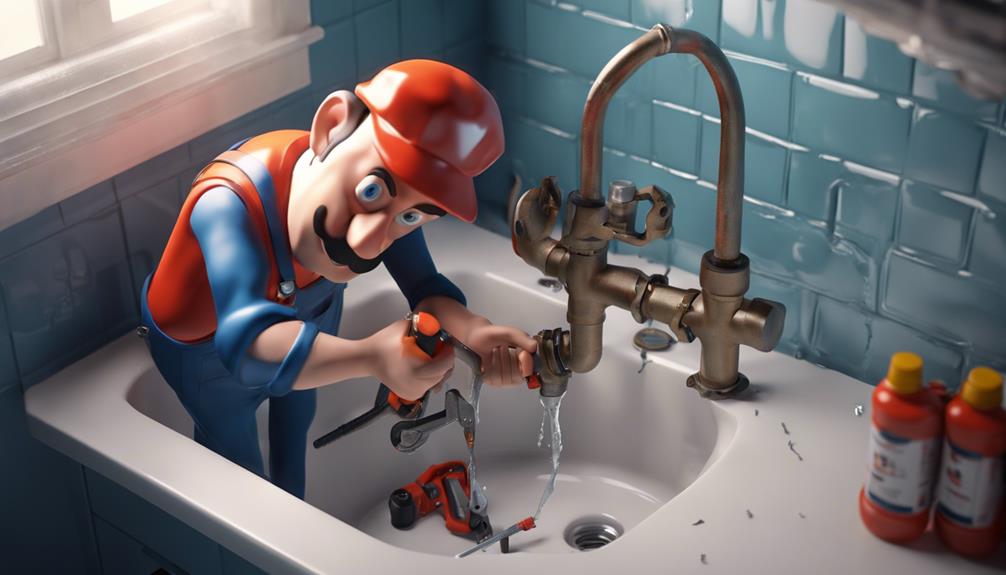Plumber Job Description
As a plumber, you execute precise installations, resolve complex issues efficiently, and provide exceptional customer service to enhance satisfaction. Possess technical skills, expertise in piping systems, and problem-solving abilities. Communicate clearly with clients, team members, and suppliers. Utilize adjustable wrenches, tubing cutters, pipe threaders, drain snakes, and multimeters for effective solutions. Adhere to safety protocols, collaborate with professionals, and navigate varied locations. Expect steady job growth, with a median annual wage of $55,160. Specialize in green technologies for higher earning potential. Demand for skilled plumbers remains strong. Your role is essential in the plumbing industry for quality service delivery.
Key Takeaways
- Execute plumbing installations and repairs with precision and efficiency.
- Troubleshoot and resolve plumbing issues efficiently.
- Provide excellent customer service for enhanced experience.
- Possess technical skills, expertise in piping systems, and problem-solving abilities.
- Adhere to safety protocols, collaborate in teams, and interact with customers effectively.
Key Responsibilities
Executing plumbing installations and repairs with precision and efficiency forms the core responsibility of a plumber. When faced with complex issues, problem-solving skills become paramount. As a plumber, you must be able to analyze the situation, identify the root cause of the problem, and devise effective solutions promptly. Whether it's a leaky pipe, a clogged drain, or a malfunctioning water heater, your ability to troubleshoot and resolve issues efficiently is essential.
In addition to technical skills, providing excellent customer service is a key aspect of the job. Communication plays a significant role in understanding the customer's concerns and explaining the necessary repairs or installations. Being able to interact professionally and courteously with clients, listen to their needs, and address any questions or uncertainties they may have, enhances the overall customer experience. Your dedication to delivering high-quality work while ensuring customer satisfaction sets you apart as a reliable and trusted plumber in the industry.
Required Skills
To excel in the field of plumbing, a wide range of technical skills combined with exceptional customer service abilities is essential. Technical expertise is critical for a plumber, encompassing knowledge of piping systems, fittings, and tools. Problem-solving skills are paramount as plumbers often encounter complex issues that require quick and effective solutions.
Beyond technical proficiency, communication abilities play an important role in this profession. Clear and concise communication with clients, team members, and suppliers is necessary to guarantee successful project outcomes. Strong customer service skills are also a must for plumbers, as they interact with clients daily, requiring patience, empathy, and the ability to address concerns promptly.
The ability to listen actively and communicate effectively helps in understanding client needs and providing satisfactory solutions. To conclude, a successful plumber possesses a blend of technical expertise, problem-solving skills, communication abilities, and exceptional customer service to deliver high-quality plumbing services.
Essential Tools
Armed with a complete set of tools, your efficiency and effectiveness as a plumber in addressing various plumbing tasks are greatly improved. Having the right types of tools is essential for tackling different challenges effectively. When it comes to wrenches, having an adjustable wrench, pipe wrench, and basin wrench from reputable brands like RIDGID or Milwaukee can make loosening or tightening nuts and fittings a breeze. For cutting pipes, a tubing cutter from brands like Lenox or ROTHENBERGER is important for clean and precise cuts.
Plumbers also rely on specialized tools such as pipe threaders for creating threaded connections. Brands like Ridgid and Wheeler-Rex offer durable and reliable pipe threaders. Additionally, having a high-quality drain snake from brands like RIDGID or General Pipe Cleaners is necessary for clearing clogs effectively.
Additionally, a multimeter from brands like Fluke or Klein Tools is essential for diagnosing electrical issues in plumbing systems. By investing in quality tools from trusted brands, you make sure that you're well-equipped to handle any plumbing job efficiently.
Work Environments
In various settings, plumbers navigate diverse work environments to address a range of plumbing issues efficiently and effectively. Here are some key aspects that define the work environments of plumbers:
- Safety Protocols: Plumbers adhere to strict safety protocols to guarantee their well-being and that of those around them. This includes wearing appropriate personal protective equipment, following established safety procedures, and being vigilant about potential hazards.
- Team Dynamics: Plumbers often work in teams, collaborating with other professionals such as pipefitters, electricians, and construction workers. Effective communication and teamwork are essential to ensure projects are completed on time and to the required quality standards.
- Varied Locations: Plumbers can be found working in residential homes, commercial buildings, industrial sites, and even outdoor environments. Each location presents unique challenges that require adaptability and problem-solving skills.
- Customer Interaction: Plumbers frequently interact with clients, explaining plumbing issues, discussing solutions, and providing cost estimates. Strong interpersonal skills are essential in establishing trust and ensuring customer satisfaction.
Career Outlook
For a plumber, the career outlook is promising, with steady demand for their expertise across various industries and sectors. The job growth for plumbers is expected to be 4% from 2019 to 2029, which is about as fast as the average for all occupations. This growth is primarily due to the need to maintain and upgrade plumbing systems in existing buildings and the construction of new structures that require plumbing systems.
As a plumber gains experience and expertise, their salary potential also increases. According to the Bureau of Labor Statistics, the median annual wage for plumbers was $55,160 in May 2020, with the top 10% earning more than $95,020. Specializing in high-demand areas such as green technologies and energy-efficient plumbing systems can further enhance a plumber's earning potential.
With the essential role that plumbers play in ensuring the functionality of buildings, the demand for skilled professionals in this field is expected to remain strong in the foreseeable future.
Frequently Asked Questions
Is a Plumbers Job Physically Demanding?
Being a plumber can be physically demanding. The nature of the job requires physical fitness to prevent workplace injuries. You'll need to lift heavy equipment, work in awkward positions, and handle tools for extended periods.
How Long Does It Take to Become a Licensed Plumber?
Becoming a licensed plumber typically takes around 4-5 years. You'll need to complete an apprenticeship for hands-on training and then pass a licensing exam. The certification process guarantees you have the necessary skills to work professionally.
What Are the Most Common Plumbing Emergencies?
To prevent emergencies, regularly inspect plumbing systems for leaks, clogs, and corrosion. Know how to shut off main water supply and have basic tools on hand. In emergencies, stay calm, shut off water, assess damage, and call a professional.
Do Plumbers Work on Weekends or Holidays?
Yes, plumbers often work on weekends and holidays to handle emergency calls. Weekend availability and holiday work are common in the industry. You can expect to receive overtime pay for working during these times, impacting work-life balance.
Can Plumbers Specialize in Specific Types of Plumbing Work?
When it comes to plumbing, specialized expertise is key. Plumbers can focus on various areas like residential, commercial, or industrial plumbing. Staying abreast of industry trends guarantees you offer the best services tailored to specific needs.
Conclusion
To sum up, as a plumber, you have the opportunity to tackle challenging tasks with precision and skill, all while providing essential services to communities and individuals in need.
By honing your craft and staying up-to-date on the latest technologies and techniques, you can secure a fulfilling and lucrative career in the plumbing industry.
So, grab your tools, don your work boots, and get ready to immerse yourself in a world where every leak is a chance to shine.







